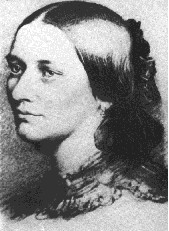|
|
|

© Kathleen McFadden, 1999-2000
Clara Schumann

(1819-1896)
When you hear the name Schumann, you likely think of the famous classical composer Robert Schumann. But what you may not know is that Robert's wife, Clara Wieck Schumann, was just as accomplished a composer and musician. By the time Clara met Robert, she already had a reputation as a musical prodigy, a child genius whose talent on the piano was hailed throughout Europe. Robert was one of her father's piano students and the two fell in love. Clara's father, who didn't have a good opinion of Robert because of his drinking, recurring bouts of depression, and reputation with women, opposed the marriage and kept the couple apart for more than a year. Robert and Clara had to go to court to fight for the right to marry. But marry they did, one day before Clara's 21st birthday. The couple's shared passion for music was both a great bond and a source of conflict. Clara liked to tour and perform; Robert hated it and didn't like for her to be away. Clara needed to practice; Robert needed quiet to compose. But Clara introduced many of Robert's pieces to the public through her concerts and they encouraged each other's music-writing. Robert's depression was an ongoing problem, eventually requiring Clara to give up touring to devote herself to his care. Despite their personal troubles, Clara and Robert continued to compose and Clara performed locally, but in the 14th year of their marriage, Robert had a mental breakdown and committed himself to an asylum where he died two years later, leaving Clara on her own to support herself and their eight children. Clara depended on the friendship and help of another composer, Johannes Brahms, to help her. When Robert entered the asylum, Brahms, who was 14 years younger than Clara, moved into her house and took over many of the household administration duties to give Clara the freedom to tour. The two developed a deep friendship and fell in love, but whether they ever became lovers is unknown. A year after Robert's death, Brahms moved away to follow his own muse, but they corresponded for the rest of Clara's life. After Brahms left, Clara relied more and more on her two eldest daughters to handle the details of her personal and professional life and she continued to perform into her 70s. When Clara died of a stroke in May 1896 at age 76, Brahms attended her funeral and died 11 months later. Clara was born on September 13, 1819.

Please click on a title to hear the Piece.
"Opus 5 No. 1 Impromptu Le Sabbat"
"Opus 5 No. 2 Caprice ŕ la Boléro"
"Opus 5 No. 4 Le Ballet des Revenants"
"Opus 20 Variations on a theme of Robert Schumann"

